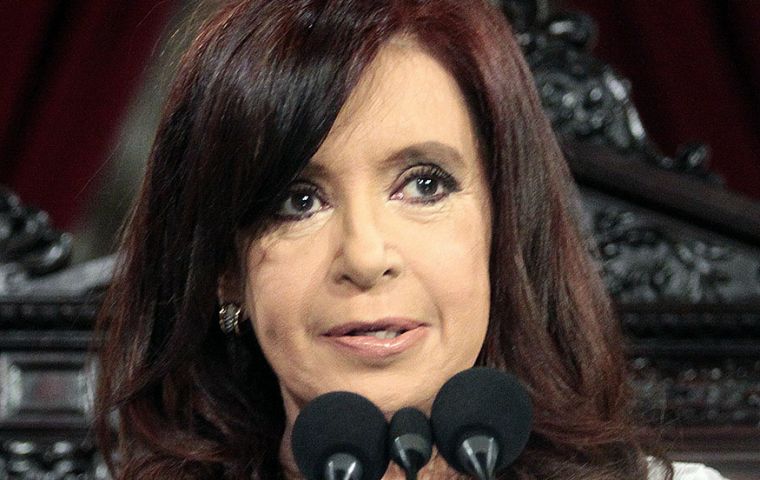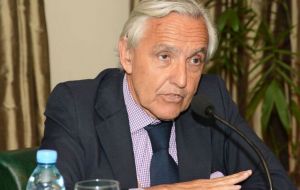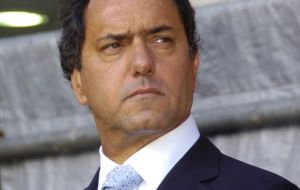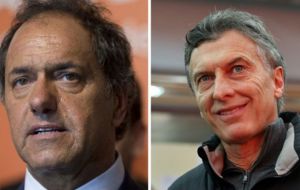MercoPress. South Atlantic News Agency
Cristina Fernandez is falling back, but with great power and plans to return in 2019, says Fraga
 Cristina Fernandez made in congress an unprecedented display of force for an Argentine president, underlining the quality and efficiency of her leadership
Cristina Fernandez made in congress an unprecedented display of force for an Argentine president, underlining the quality and efficiency of her leadership  As to Sunday's results, Fraga is cautious, but anticipates a runoff in November since it's hard to see Scioli despite leading, catching the 40% milestone
As to Sunday's results, Fraga is cautious, but anticipates a runoff in November since it's hard to see Scioli despite leading, catching the 40% milestone  People are uncertain about what degree of independence Scioli will enjoy and this is crucial to attract independent and last minute voters.
People are uncertain about what degree of independence Scioli will enjoy and this is crucial to attract independent and last minute voters.  Scioli and Macri have behind them very strong districts: between the two they have half the Argentine population and 65% of the country's GDP.
Scioli and Macri have behind them very strong districts: between the two they have half the Argentine population and 65% of the country's GDP. President Cristina Fernandez is falling back ahead of Sunday's election, but with great power, and she has the intention of returning to office in the next presidential elections, 2019, said the political analyst and columnist Rosendo Fraga regarding the current political scenario in Argentina. On Sunday Argentines will be electing president, half the Lower House a third of Senate seats, governorships and for the first time Mercosur parliament representatives.
“With only two months before Sunday's election, Cristina Fernandez made in congress a display of force without precedents for an Argentine constitutional president, which underlines the quality and efficiency of her leadership” said Fraga who then enumerated her victories or rather the magnitude of her political might.
“In the Lower House she managed the approval of the budget, which limits the next president's margin of action, with support from an ample majority, 137 to 70 votes. The Senate unanimously, all political parties, voted her initiative to turn into law the UN General Assembly 'basic principles for sovereign debt restructuring', which regulates relations with holdouts. This bill complicates any potential agreement or future understanding with the holdouts and if this is to advance, most probably the same members who voted the UN initiative into law, will have to derogate the bill, as well as the 2005 'clamp' bill and the 'sovereign payment' bill of 2010, virtually limiting all negotiations”, described Fraga.
“This, in my opinion is signaling that Cristina is pulling back, with incredible power, and with the clear intention of returning to office with the presidential elections of 2019”.
Under Argentine law, presidents can repeat two consecutive four-year periods but then have to miss one before attempting again. Likewise the leading presidential candidate must obtain 40% of ballots and a ten point difference over his runner up or a majority of 45% in the first round, to avoid a runoff a month later.
Fraga then mentioned some interesting facts, almost unique about Sunday's election, particularly since the two leading candidates, incumbent Daniel Scioli and his runner up, Mauricio Macri have sports backgrounds. In effect Scioli gets involved in politics in 1997 based on his popularity as world speedboat champion and the fact he recovered from the loss of an arm in a competition.
Macri on the other hand joins politics in 2003 following his success as president of the Boca Juniors football club, the most popular team of Argentina. “From a sociology political point of view this is a unique phenomenon, since neither Scioli or Macri had any previous activity in politics. However the third leading candidate in the dispute effectively was involved in politics since his time as a university student”. On the other hand neither Scioli or Macri have any formal political or ideological formation, they are not keen in reading books and are not good at making speeches. The two come from families with strong business backgrounds, and none of them is a lawyer, as has been the case in Argentina since 1983.
Furthermore in Argentina it is very difficult to be involved in a presidential campaign if you don't have control on an important political turf. In effect, Scioli as governor of the province of Buenos Aires and Macri as mayor of the City of Buenos Aires have behind them very strong districts: between the two they have half the Argentine population and 65% of the country's GDP. Massa is a former mayor of Tigre, a city of 1.5 million, but it's not a sufficiently strong springboard.
As to Sunday's results, Fraga is cautious, but anticipates a runoff in November since it's hard to see Scioli despite leading, catching the necessary 40% milestone, even when he has a comfortable plus ten point difference over Macri.
“Argentina does not have a clear cut ballotage system demanding 50% of the vote in the first round, it's an attenuated version. In Brazil, Chile, Colombia, Uruguay among others, 50% is the case and if this was so in Argentina, there's no question about a runoff”.
”But why has Scioli only scratched at times the 40%? One is the Cristina Fernandez candidate in the Buenos Aires province (Argentina's main electoral district with 36% of votes), cabinet chief Anibal Fernandez, a character which triggers much resistance, and secondly the fact that it is evident that Scioli is very much conditioned by the president and Kirchnerism, and people are uncertain about what degree of independence he will enjoy and this is crucial to attract independent and last minute voters. Macri on the other hand does not seem to be able to take off from his 28%/30% of vote intention, while Massa has been cutting difference. But in a runoff Massa's votes are expected to split reasonably even between Scioli and Macri, confirming the incumbent as the successor of Cristina at the Pink House“.
As to foreign affairs, Fraga argues Argentina is in a paradoxical situation: ”relations with Mercosur members are strained because of the Kirchners' trade policy, protectionism and virtual ban on remittances, but strangely enough all regional presidents support Cristina and her candidate Scioli. Nevertheless the three candidates, Scioli, Macri and Massa agree that Argentina must balance its foreign relations, currently centered in China and Russia, globally, and with Venezuela and Cuba regionally. But Scioli most probably will have the greatest difficulties in implementing changes since Cristina will retain a strong share of power”.
Last but not least, Fraga recalls that only a month ago one of the Grandmothers of Plaza de Mayo, strong supporters of Cristina Fernandez and her human rights policies, openly said that they were happy with Daniel (Scioli), “he's a good fellow, but a transitional candidate, since Cristina will be back in 2019”.
Cabinet chief Anibal Fernandez who every morning is quick to draw and fire at any negative comments against the administration, usually with irony, took two days to comment on the 'transitional' candidate statement, and simply downplayed the issue with no affirmative display to the contrary.




Top Comments
Disclaimer & comment rules-

-

-

Read all commentsBack in four years?
Oct 23rd, 2015 - 07:45 am 0That didn't work out too well for Nestor..
She's been learning from nice Mr Putin, have a stand-in to keep the seat warm, take a back seat for a while and then return.
Oct 23rd, 2015 - 10:30 am 0Is she really the best that Argentine politics has to offer?
Newly coined word...
Oct 23rd, 2015 - 11:13 am 0Ineptocracy:
A system of government where the least capable to lead are elected by the least capable of producing, and where the members of society least likely to sustain themselves or succeed, are rewarded with goods and services paid for by the confiscated wealth of a diminishing number of producers.
Commenting for this story is now closed.
If you have a Facebook account, become a fan and comment on our Facebook Page!